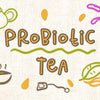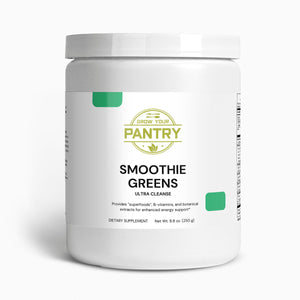Kombucha Side Effects: What They're And How To Avoid
Over the last couple of years, kombucha has become popular due to its health benefits, such as improved metabolism and natural probiotics. Kombucha tea gains its popularity from its microbial composition and the micro-nutrients found in the tea leaves that are used to brew the tea before fermentation.
However, just like any other drink, this fermented tea does have some downsides. While this shouldn’t be the reason to avoid the fizzy drink altogether, it's recommended to find the right balance to prevent some of the side effects linked to drinking kombucha.
Not Much Time? Skip To What You'd Like To Learn...
Common Side Effects

Weight Gain
While kombucha is prized for its weight control benefits, some batches may contain excessive calories in the form of sugars. When the body absorbs more carbs than it needs, the excess is converted into fat, thus resulting in gaining weight. On average, kombucha contains 2 to 6g of sugar (check out our Kombucha and Sugar article to learn more) and around 34-47 calories per 8 oz (227ml) serving. The variation is a result of different recipes and brewing time.
On average, your body requires 2000 calories per day to maintain weight. With this number, we can calculate how many calories from kombucha is too much, add up all the calories from your breakfast, lunch, dinner, and snacks and subtract it from 2000. This will give you the maximum number of calories that you can consume in kombucha without gaining additional weight.
If you're interested in learning more about weight control, check out our post Kombucha For Weight Loss.
Sleep Deprivation and Anxiety
Regular kombucha tea contains caffeine. Caffeine can cause anxiety and loss of sleep, especially in people who have low caffeine tolerance. While it is possible to reduce the amount of caffeine in the tea leaves, the reality is that it doesn’t eliminate caffeine from kombucha. However, you can use alternative herbal blends to reduce or remove the caffeine.
Rooibos tea is a great alternative. Rooibos is a reddish herb with a flavor similar to black tea but without the caffeine molecules. Other herbal teas that can be used include river red gum, lemon balm, Mexican bay leaf, and white oak.
Learn more about caffeine content in our article How Much Caffeine In Kombucha?
Bacteria Infection
Kombucha contains probiotics comprising of bacteria and yeast culture. Some of the bacteria can attack weakened immune systems. HIV, AIDS and cancer patients are therefore advised to steer clear of this brew due to its possible effects on compromised immune systems.
This results in bacteria growth and infection that could have otherwise been destroyed by a healthy immune system. It's necessary to keep in mind that a compromised immune system is less likely to fight off such an infection leading to life-threatening complications.
Digestive Distress
While the probiotics found in kombucha do play an essential role in maintaining a healthy gut environment, too much of them can destabilize the composition of gut bio. This leads to digestive distress. The carbon dioxide in kombucha can also lead to excess gas and bloating when you drink too much.
Alcohol Content
Some kombucha batches, mainly home-brewed ones, may contain up to 2% alcohol. While usually in kombucha it gets broken down by the bacteria, there’s still the possibility of some of it remaining in the final drink. While it's not enough to cause inebriation, it is certainly enough to get absorbed into the blood system. This is one of the reasons why breastfeeding and pregnant women shouldn’t have kombucha.
Hypoglycemia
Kombucha has an indirect effect on blood sugar levels due to its direct influence on metabolism.
Kombucha contains active microbes and enzymes derived from the tea and the breakdown of the ferment by the culture. When consumed, these molecules trigger metabolism leading to decreasing the level of blood sugar.
While this is just fine for a healthy person, it can be quite risky for those who have type 1 diabetes. This is because the body fails to naturally regulate sugar in the blood leading to hypoglycemia, which is a condition characterized by dangerously low levels of blood sugar.
IBS
Kombucha has been shown to trigger irritable bowel syndrome in caffeine intolerant consumers. Once consumed, the caffeine causes gut irritation and can even worsen diarrhea. Other symptoms of caffeine-induced IBS include gastrointestinal discomfort.
Interferes With Glucose Control During Surgery
Kombucha has been shown to affect blood glucose levels after consumption. This effect may last up to 2 weeks. To avoid complications with glucose levels during surgery its recommended to avoid kombucha for up to 2 weeks before and after surgery.
Not Safe During Pregnancy and Breastfeeding
Kombucha may contain unhealthy amounts of caffeine and trace amounts of alcohol. The probiotics also present in kombucha can be rather harmful to the unborn baby. After absorption, they usually circulate within the body leading to absorption through breastfeeding.
Interacts With Antabuse
Antabuse is used to treat chronic alcoholism. When kombucha is consumed after taking Antabuse, it interacts, leading to adverse health effects. This leads to alcohol intoxication, cardiac disease, and even hepatotoxicity.
Lead Contamination
Lead contamination in kombucha usually arises due to unhygienic brewing conditions as well as improper handling of the drink after brewing to its consumption. Due to its acidic nature brewing in earthenware and lead-glazed ceramicware, kombucha naturally dissolves the heavy metal. The only way to avoid lead contamination is by relying on glassware when preparing kombucha and ensuring that it doesn’t come into contact with contaminants by safe handling.
5 Kombucha Myths

1. Cures Everything
One of the most common myths is that kombucha cures everything. Kombucha does contain probiotics which are linked to numerous health benefits. The truth is kombucha doesn’t cure diseases. Instead, it helps in preventing the degradation of the immune system. Some of the documented illnesses that can be prevented by the drinking kombucha include type 2 diabetes and heart disease. *Please seek medical advice before consuming if you suffer with either*
This is because kombucha contains prophylactics benefits that are derived from the active microbes, which help in eliminating toxins from the body and enhancing the general metabolism. Kombucha also contains trace amounts of acetic and glucuronic acid, which have antimicrobial effects that suppress any growth of undesirable yeast and bacteria in the gut (link).
2. Reduces HIV/AIDS
The myth that kombucha can reduce HIV is misleading. This is because kombucha drunk by people with HIV and AIDS can lead to an increase in opportunistic bacterial infection. For this reason, it’s not recommended to have kombucha if you have developed AIDS.
3. Cures Diabetes
This myth has some bit of truth in it. This is because kombucha contains probiotics and other helpful benefits that are derived from the green tea used in brewing. These have a positive effect on diabetes type 2 patients. Its consumption can increase the metabolism rate. However, this beneficial effect is only experienced in type 2 diabetes; in fact, it's recommended to avoid kombucha if you have type 1 diabetes as it might expose you to hypoglycemia. If you have diabetes, consult a doctor before consuming it.
4. Reduces Cancer
It is not recommended for cancer patients to consume kombucha as it contains living culture. This can negatively affect a weakened immune system.
However, research has been done on the effect of kombucha on cancer cells. Research on the effects of kombucha consumption on the growth of cancer cells is still in its infancy stage, a research paper from 2008 did show that drinking kombucha did reduce the survival rate of cancer cells. This is mainly attributed to the presence of antioxidants in kombucha (link).
5. Make You Drunk
This myth originates from the fact that ethanol is produced during the fermentation process of kombucha. This can lead to up to 2% alcohol concentration, especially in home-brewed kombucha. However, you would have to drink a lot before you can get drunk; in fact, you are more likely to feel satiated much faster than you can absorb the alcohol.
FDA Regulation and Kombucha Claims

Is It Safe To Drink Kombucha Everyday?
Yes, the FDA advises 4oz (110ml) per day is a safe amount. However, keep in mind that this volume will have varying amounts of calories and caffeine, depending on the brewer and brand. The secret lies in finding a balance between the amount of kombucha you consume versus the number of nutrients in it.
How Much Kombucha Can You Drink Per Day?
It's recommended to limit your kombucha intake to not more than 4 ounces per day. It’s recommended to know the exact amount of kombucha consumed daily to keep track of the amount of sugar consumed as well as the caffeine amounts.
The FDA categorizes kombucha as a dietary supplement and therefore doesn’t have to abide by any medication standards. For this reason, very few of its claims have been officially documented.
According to the FDA, if kombucha is brewed in safe conditions, then it is safe for human consumption. The FDA does also list some of the possible adverse effects linked with enjoying kombucha. Commercial brewers and bottlers of kombucha have to abide by set FDA standards to prevent poor handling during fermentation. These include:
pH levels
To prevent the growth of spore-forming bacteria and other unwanted pathogens and mold, the FDA recommends that the pH level of the kombucha brew should be monitored often. If a brew fails to achieve a pH scale of 4.2 or lower within the first seven days of fermentation, then this indicates that the brewing culture has been contaminated.
The FDA prohibits the sale of kombucha with a PH higher than 4.2 or below 2.5, as this is not considered safe human consumption.
Pasteurization
This refers to the process of treating food with mild temperature before packing it to eliminate pathogens as well as extending the shelf life. According to the FDA, kombucha should be pasteurized at 180 degrees F (82 degrees C) for up to 15 seconds. This effectively disables the fermentative culture, thus preventing further alcohol production during storage.
Alcohol
FDA requires that all kombucha products be labeled with a health warning statement stating the presence and amount of alcohol on the packaging. After brewing kombucha contains less than 0.5 % alcohol but this usually goes up to 1.5% during storage.
Sugar Content
The FDA mandates that all unflavored kombucha products label the amount of sugar and calorie content per drink. Under the Standard Operating Procedures (SOPs) and Good Manufacturing Practices (GMPs), commercially produced kombucha, on average, has about 2 to 3 grams of sugar and about 30 calories per 8 ounces serving.
Caffeine Content
Currently, the FDA does not require stating of caffeine levels in kombucha on the product labels. However, the FDA does recognize caffeine as generally safe to consume up to the level of 0.02%. This is much higher than the average amount of caffeine in an 8-ounce serving, which is around 0.001%.
Antioxidants and Detoxing

What is detoxing, and what are antioxidants?
Detoxing refers to the removal of toxins from the bodies cells, thus improving overall health. The process relies on antioxidants which serve to oxidize free radicals which would otherwise have oxidized the body cells causing harm. For detoxing to work, you must continually build up the number of antioxidants in your body by following a regular detox diet.
While there’s scientific evidence that kombucha prepared with specific tea leaves such as green tea will contain the same detox characteristics as the tea itself, not everyone believes that it can detoxify.
Kombucha Detox Diet
One of the primary reasons why most people take kombucha is for detoxification purposes. However, for the best results, a daily kombucha serving should be accompanied by a lifestyle change. This is both in terms of how you eat and physical exercises. Physical exercise increases the blood circulation efficiency making it much easier for your body to get rid of toxins.
Tips On Using Kombucha To Detox
-
Start with minimal amounts to avoid adverse reactions
If it's your first time drinking kombucha, then its recommended using minimum amounts diluted with freshly brewed herbal tea or water. The ratio of kombucha should then be increased gradually for the next 3 to 5 days (link) (link). -
Maintain a regular detoxing schedule
The only way detox will work is if you consume the required probiotics and antioxidants or a regular basis. Otherwise, the amount of toxins will gradually increase. A 5- or 10-day detox schedule is best recommended when using kombucha. -
Stay hydrated
Once the toxins and free radicals are oxidized, they are then transported to the kidneys for excretion. Your kidneys work best when you keep your body hydrated, so remember to drink plenty of water during the day or even with the kombucha. This makes it possible for the body to transport the toxins from the organs.
What are antioxidants?
Antioxidants are molecules that prevent oxidation of living cells by free radicals. They accomplish this by oxidizing the free radicals, thus slowing down the deterioration of health.
Does kombucha really detox your body?
Yes, kombucha contains some of the detoxing characteristics linked to tea that help in removing toxins. During the steeping of the tea leaves, the molecules responsible for detoxing get infused into the kombucha giving it the detoxifying characteristics. Green tea contains antioxidants that play a vital role in the removal of free radicals, which would have otherwise been harmful to the body (link).
Does kombucha cause you to fart?
Yes, excess consumption of kombucha may lead to IBS and excess gas due to the carbon dioxide, which is dissolved in the kombucha during fermentation; this results in an increased urge to fart.







